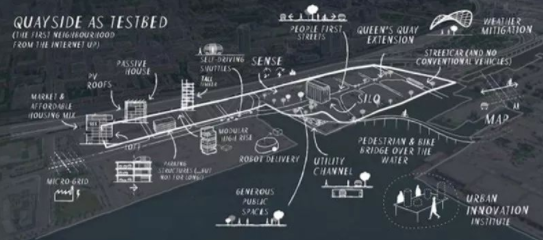
Looking back at 2018, the technology that is changing the rules of the game in the future
2019-01-14
Looking back on 2018, new digital-based technologies continue to drive change in all walks of life. Artificial intelligence, genetic technology, Internet of Things, 3D printing, blockchain... The application of these technologies provides us with an imaginative space for future technology applications while changing the rules of traditional industry games. Of course, while seeing a bright future, the risks behind the technology are equally worthy of attention; while welcoming the changes brought about by new technologies, how to establish new rules of the game can not be ignored.
1. Genes determine the future?

In 1997, the American film Gattaca described to us a future society in which genes determine fate. Modern medical technology companies are already using genetic testing to let parents know about the risk of heart disease and cancer in their future, and even predict their IQ and longevity.
Genetic testing has changed the fate of some people, the most famous of which is Hollywood actress Angelina Jolie. At the beginning of 2013, influenced by family inheritance, after sequencing the gene, it was known that there was a high probability of breast cancer (80%) and ovarian cancer (50%) in the future. Julie decided to remove the breast, ovary and fallopian tubes. To minimize the risk of cancer.
Although third-party genetic testing carries the risk of abuse of personal data, genetic testing is still seen as a useful tool for many medical professionals and parents. They believe that genetic screening can prevent children's potential risk and provide customized treatment options.
But we also need to realize that gene sequencing can also have some unpredictable effects. For example, when you know that you are very likely to have diseases that are currently incurable, such as Alzheimer's, in the future, how many people can maintain a stable and optimistic attitude? Who can ensure that their living conditions will not change? For another example, when an insurance company receives the gene sequencing data and no longer provides the corresponding guarantee, how can we protect our rights and interests?
2. Smart city construction with controversy

Sidewalk Labs, owned by Google's parent company Alphabet, is transforming the waterfront of Toronto, Canada into a high-tech new district called Quayside, with a view to creating a new digital urban community that will serve as a window into the future of smart cities. Based on IoT technology, the project collects urban data from a vast sensor network and provides decision support for urban design, planning, and sustainable development.
According to the plan, all data of transportation, vehicles, air quality, residential activities, and various public facilities will become the data source of smart cities. The use of artificial intelligence and robots will enable a high degree of automation and autonomy in future cities, and all actions such as maintenance, delivery, and garbage disposal will be fully automated.
All the visions are beautiful. The convenience brought by the future of automated life comes from the amount of data we open. The more data, the more comprehensive and accurate the services we enjoy. But the more we share, the more we lose. Is it worthwhile to give up control of personal privacy in exchange for external enjoyment?
3. Voice intelligence changes the way people communicate

In the past ten years, translation software has experienced explosive growth. Especially in recent years, the rapid rise of AI voice technology has made AI translation more mature, and intelligent translation machine has become an indispensable tool for many people to go abroad for business and travel. For example, Google's Pixel Bud smart headset integrates with Pixel smartphones and Google Translate app to provide users with more convenient instant translation.
At present, Google smart headsets can achieve more than 40 language translations, short sentences can be almost instantaneous translation, while longer sentences take a few seconds to process. At the same time, it is susceptible to external noise in places with noisy environments. Although real-time translation is still in its infancy, it is undeniable that in the next few years, the technology will be greatly improved and human translation will soon become a thing of the past.
Based on the development of AI-based speech technology, human communication in the future will be faster, work more efficiently, and better break the boundaries between regions and languages. Perhaps the large-scale application of this technology will lead to the convergence of human language in the future.
4. Subverting manufacturing metal 3D printing

3D printing has been developed for many years, but in addition to plastics and resins, other materials print at a slow rate and are expensive. In the past year, many research institutes and companies have made breakthroughs in metal 3D printers.
California startup HRE Wheels teamed up with GE Additive's AddWorks team to create the first 3D printed titanium alloy wheel built using electron beam melting. Compared to traditional monolithic block drilling methods, 3D printing technology significantly reduces material waste. In addition, US startups Markforged and Desktop Metal launched their own metal 3D printers in early 2018. It is reported that Desktop Metal's 3D printer is about 100 times faster than previous metal printing.
3D printing of metal parts will completely change the large-scale, batch production mode of traditional industries. In the future, manufacturers will no longer need a large inventory of metal parts, but can produce lighter, stronger and more complex zeros anytime, anywhere. component. These are unmatched by traditional metal manufacturing processes.
5. Really clean zero carbon emissions

Coal plays an extremely important role in the history of human development, especially the development of two industrial revolutions. But industrialization has also made the drawbacks of fossil fuels more apparent. With the global awareness of environmental protection, clean energy has become an important theme of global economic development. Many developed countries are reducing and shutting down coal-fired power plants.
The EU has announced that it will close all unprofitable coal mines on January 1, 2019. In 2018, the generation of renewable energy such as solar energy and wind energy in Germany exceeded coal for the first time, accounting for more than 40% of the total power generation. In addition to many renewable energy sources, some technology innovation companies are exploring new power generation technologies. In June 2018, US startup Net Power conducted a new technology test using supercritical carbon dioxide to generate electricity at a natural gas power station in Houston.
In the supercritical state, carbon dioxide has gas-like diffusivity and liquid solubility, and can be pumped, compressed, and used to drive a turbine engine to generate electricity instead of steam. This means that carbon dioxide can be continuously recovered and captured as needed, and any captured carbon dioxide can be sold to third parties for the manufacture of cement, plastics and other carbon-based materials.
According to NET Power's plan, if the test is successful, the commercial application of the technology will be completed by 2021. If similar projects can be effectively expanded, it will be expected to reduce human dependence on fossil fuels and further realize true clean energy.
6. Blockchain intervention in network security

2018 is the craziest year of data breaches. Data breaches such as Facebook and Marriott have made users think more and more seriously about network security and privacy issues. The distributed data storage characteristics of the blockchain can make it a new technology to solve the trust and security problems of transactions, and thus have a place in the field of network security.
In September 2017, digital currency Zcash announced the use of the new anonymous encryption technology zk-SNARKs to hide account balances and user addresses. In 2018, the media and the industry are increasingly interested in zk-SNARK. zk-SNARK is called zero-knowledge Succinct Non-Interactive Arguments of Knowledge (zero knowledge, concise, non-interactive knowledge argument).
The “zero knowledge” certificate allows a party (certifier) to prove to the other party (the verifier) that a statement is true without revealing any information beyond the validity of the statement itself. When the user proves to the network (through mathematical proof) that he or she has the correct password, the password itself is not actually revealed. This technology allows others to verify the validity of a transaction without knowing the specifics of the transaction.
According to Vitalik Buterrin, founder of Ethereum, zk-SNARK is "a technology that absolutely changes the rules of the game." In the future, how to protect the security of transactions and protect user privacy, the emergence of zk-SNARK, at least provides us with a new possibility.
